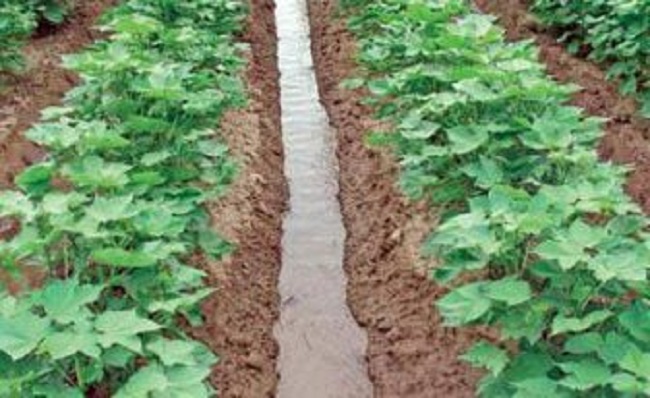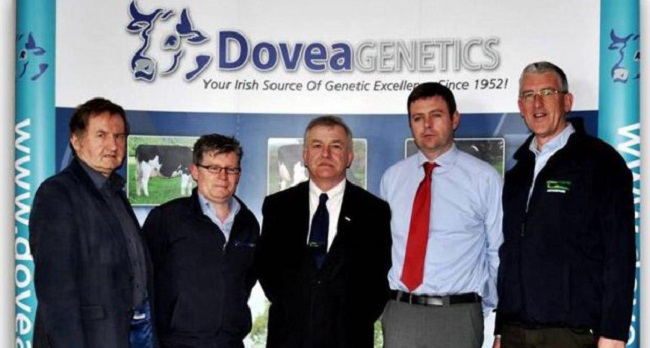Eritrea: promoting development, food security

Irish Member of Parliament Brian Hayes (3rd from right) during an Eritrean visit aimed at observing a number of cutting-edge Irish government sponsored agricultural programs.
In 1994, Eritrea released the Macro Policy Paper (MPP), articulating a broad national development policy with a special focus on agriculture.
Specific points raised in the document include: the need to create of a modern, technologically advanced and competitive agricultural sector; the importance of producing high value agricultural commodities through the development of irrigation and water collection systems; how to better utilize water for irrigated agriculture and new irrigation schemes; and the need to promote research and extension.
As an instructive example, consider growing Irish-Eritrean ties. Over the past several years, Ireland and Eritrea have developed an increasingly strong partnership, particularly within the areas of agricultural development and general capacity building.
A number of initiatives and projects across Eritrea have involved the participation, inter alia, of Irish Aid, the Irish non-governmental organization (NGO) Vita, and Teagasc, the agriculture and food development authority of Ireland, which seeks to support science-based innovation in agriculture and bioeconomy.

A pilot diary and potato programme in Eritrea with the collaboration of Irish NGOs Vita, Teagasc, Gorta and Séamus Crosse are part of the ambitious, large scale national potato and diary programme
Of note, Irish developmental support to and collaboration with Eritrea have been influential in the development of unique fuel-efficient cooking stoves. Significantly, the stoves, which are now utilized by tens of thousands of households across Eritrea, reduce the consumption of wood for fuel by up to 50% (which is absolutely vital for Eritrea, since environmental degradation through deforestation has long been a critical problem), improve ventilation and working conditions, and may prove extremely beneficial toward producing a variety of positive socio-economic development outcomes (e.g. through reducing time spent on searching for wood).
Another key area of Irish-Eritrean cooperation has been in improving potato farming and developing technology underpinning the dairy industry in Eritrea (e.g. research, extension, and capacity building of farmers and marketing).
Last year, recently established dairy pilot programmes in Eritrea were found to have produced highly successful results, with a doubling of milk yields. Additionally, Teagasc introduced a world class seed potato, Electra, which can more than double the yield of local varieties. Notably, although potatoes have historically not been widely cultivated in Africa, nor included in food security discussions, they provide high nutrition and are adaptive to many climates. Moreover, they use less water per nutritional output than many other crops, are high in calories and essential nutrients, and are a great cash crop for small farmers because they can be stored for long periods of time until market prices are favourable.
These multifaceted initiatives by Irish and Eritrean partners are particularly significant to supporting sustainable livelihoods, improving food security, and helping transform the lives of thousands of farmers, families, and communities across Eritrea.
Hunger and famine, as convincingly shown through numerous detailed studies by Amartya Sen, the Nobel prize-winning economist, are often not caused by flooding, drought, or other “natural disasters,” but through social, economic, and political conditions. Guaranteeing the right to food requires not only genuine political will, committed leadership, and firm commitments, but also strong support from and collaboration between local communities, international partners, development organizations, and civil society.

Seamus Crosse (Greenfield Dairy Solutions); Conor Ryan (Dovea); Professor Gerry Boyle (Teagasc director); Ger Ryan (general manager, Dovea); and James O’Loughlin (Teagasc), at a meeting of the Dovea Genetics, Teagasc and Vita partners in the cattle breeding programme in Eritrea
Ireland’s cooperation with and support to Eritrea also involves the development of unique drip irrigation schemes, dams, and water collection points, crucial since water is precious in Eritrea; average annual rainfall is only approximately 380mm and farmers have to cope with regular droughts and crop failures. As well, Irish-Eritrean ties extend to efforts to address environmental degradation, a problem dating back to Eritrea’s period under colonialism and foreign administration.
Remarkably, due to universal land systems, agricultural expansion, and deforestation policies successively implemented by the Italians, British, and Ethiopians, Eritrea’s national forest cover decreased from 30% in the late 1800s to a meager 5% of the country by 1960 (Fiore 1952; MoA 1994; Renato 1911).
Other influential factors for widespread degradation include the long, destructive war of independence, harsh climatic conditions, and various population practices (such as the mass utilization of wood as fuel for cooking purposes).
Overall, Eritrea’s close partnership with Irish organizations and government institutions is proving extremely beneficial to promoting sustainable livelihoods and establishing a strong agricultural sector, as well as ensuring that Eritreans, in particular the poor and vulnerable, have access to sufficient and nutritious food.
Dr. Fikrejesus Amahazion
Source. Tesfanews.net

